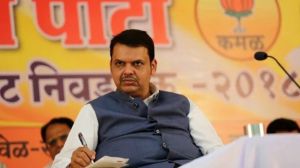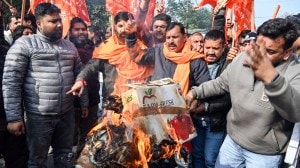Ready to discuss even Kashmir: PM
Like a master card player who revels in never fully revealing his hand, Prime Minister Atal Behari Vajpayee today neatly transferred some o...

Like a master card player who revels in never fully revealing his hand, Prime Minister Atal Behari Vajpayee today neatly transferred some of the responsibility to rein in Pervez Musharraf onto Chancellor Gerhard Schroeder8217;s shoulders, telling him publicly that he should persuade the Pakistani president to stop cross-border terrorism.
8216;8216;India,8217;8217; Vajpayee then announced at a joint press conference with his German counterpart, 8216;8216;is ready to talk to Pakistan on all issues, including Kashmir.8217;8217; The startling statement was made in answer to an Indian journalist8217;s 8216;8216;crooked8217;8217; question, as Vajpayee called it, who sought to know what the Prime Minister expected from Schroeder when he hosted Musharraf in Germany in June.
| Shut shop by May 31: Pak to PoK ultras |
|
|
Muzaffarabad: Militants based in Pakistan-occupied Kashmir vowed today to resist moves to have their offices closed, testing Islamabad8217;s resolve to mend ties with India. 8216;8216;There is a tremendous pressure from the Pakistani side to close offices,8217;8217; said the leader of one outfit, who declined to be identified either by name or by group. 8216;8216;There is a complete unanimity in our ranks that we will not close down offices-cum-residences in base camp,8217;8217; another militant leader said, also on condition of anonymity. Pakistani Kashmir separatists call PoK the 8216;8216;base camp8217;8217; for the separatist movement in Jammu and Kashmir. Until recently, Pakistan8217;s crackdown on militancy linked to Kashmir has been aimed mainly at the Pakistan-based Lashkar-e-Toiba and Jaish-e-Mohammad. But it now appears to be concentrating more on Kashmir-based groups, including the largest, Hizb-ul-Mujahideen, which appears on the US watchlist of terrorist groups. Also on that list are two other Kashmir-based outfits, Al-Badr 8216;8216;Any attempt by the Pakistan government to close down the offices will convey a negative signal across the Line of Control to the people of Kashmir and to Kashmiri militants,8217;8217; said one commander. |
Germany, the PM replied, was a member of the international community in the forefront of the fight against terrorism and raising its voice alongside India in doing so. Then he quietly pulled out an ace. When Musharraf comes here, the PM said, we want the German Chancellor to tell him to stop cross-border terrorism.
Answering the same question minutes later, Schroeder showed the stuff with which he had won his election by a one per cent cliff-hanger last year. There is an old Indian saying, he began, or if there isn8217;t one then I8217;m making it up right now. Which is, never reveal publicly what you8217;re going to tell your guest before you tell him about it.
To the sound of laughter, the Chancellor added that he was ready 8216;8216;any time and anywhere8217;8217; to help resolve any issues, especially if they were made in the constructive spirit Vajpayee had just showed by once again offering peace talks with Pakistan.
Then a German journalist asked Vajpayee why India continued to refuse the Kashmiris the right to a referendum. The PM pointed out that in the recently held elections in Kashmir, in which 8216;8216;Pakistan tried hard not to allow people to vote, and even threatened them, people had come out in large numbers. The elections have decided what people want. There is no need for another decision,8217;8217; Vajpayee added.
Meanwhile, in an interview to Der Speigel magazine on the eve of his visit here, the Prime Minister admitted that he would 8216;8216;retire8217;8217; if his attempt to make peace with Pakistan for the third time did not bear fruit. He went on to add that when he had faced the people in Kashmir, it was clear to him that it was his 8216;8216;obligation8217;8217; to take up the peace process again and 8216;8216;liberate8217;8217; them from the 8216;8216;crisis state of violence and terrorism.8217;8217;
But even if Vajpayee8217;s visit to Germany 8212; the first by an Indian prime minister in a decade 8212; hasn8217;t set the Rhine on fire, it may have never been intended to. Berlin, followed by Munich tomorrow, is really the first stop on a 3-nation tour over the next week where the Prime Minister is expected to figure out a first-hand sense of the post-Iraq world order.
Coincidence or not, Vajpayee8217;s European sojourn takes him to Germany, Russia and France, all three countries that in varying degrees opposed the might of the US over its recent decision to invade Iraq.
But with Schroeder now keen on making up with America and Russia8217;s Putin expected to bargain hard with George Bush when they meet on Sunday at St Petersburg tercentenary celebrations, and even France keen to end trans-Atlantic spat it led with such aplomb some weeks ago, the Indian delegation may well be positioned to get a good grip of international realpolitik.
External Affairs Minister Yashwant Sinha insisted to journalists today that there was 8216;8216;complete understanding8217;8217; between Germany and India on a variety of issues, from the Middle East peace process to the sources and opposition to international terrorism which hurt both countries as well as the 8216;8216;assessment of the situation in Iraq.8217;8217;
Berlin and New Delhi clearly see eye to eye on the fact that the UN must be given a much larger role to play in Iraq, although the UNSC resolution 1483 was a 8216;8216;step forward,8217;8217; Sinha said. Significantly, Iraq8217;s sovereignty and territorial integrity must be maintained, both sides felt.
But Indian sources also admitted that Berlin may not want to once again 8216;8216;take a lead role8217;8217; in being critical of the US, even if they disagreed with Washington8217;s accusations that Iran was supporting the Al-Qaeda. By the time the week is out, New Delhi believes, some of the muddied waters would be clear again.
- 01
- 02
- 03
- 04
- 05































